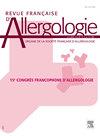No clinically meaningful impact of remibrutinib on mean immunoglobulin levels or infections in chronic spontaneous urticaria
IF 0.3
4区 医学
引用次数: 0
Abstract
Prérequis/contexte
Remibrutinib is an oral, highly selective Bruton's tyrosine kinase (BTK) inhibitor.
Objectifs
As BTK plays an important role in immune responses, we analyze the impact of remibrutinib on mean total immunoglobulin levels and infection rates in patients with Chronic Spontaneous Urticaria (CSU) in the phase 3 REMIX-1 and REMIX-2 studies.
Méthodes
REMIX-1/-2 are multicenter, randomized, double-blind, placebo-controlled studies assessing the efficacy and safety of remibrutinib in patients with CSU inadequately controlled by H1-antihistamines. Patients were randomized 2: 1 to remibrutinib 25 mg twice daily or placebo (24 weeks), followed by open-label remibrutinib (28 weeks). We present a pooled data analysis for mean serum immunoglobulin levels (IgA, IgE, IgG, IgM) assessed at baseline, weeks 12, 24, and 52, and exposure-adjusted occurrence rate (EAOR) of infection treatment-emergent adverse events (TEAEs) per 100 patient-years.
Résultats/discussions
The safety analysis included 606 and 306 patients in the remibrutinib and placebo groups, respectively. Mean total immunoglobulin levels remained similar over time and between arms. For remibrutinib, mean immunoglobulin levels at baseline and week 52, respectively, were: IgA, 2.2 g/L and 2.3 g/L; IgE, 528.0 μg/L and 535.0 μg/L; IgG, 11.3 g/L and 10.9 g/L; IgM, 1.1 g/L and 0.8 g/L. Up to week 24, ≥1 infection-related TEAE occurred in 33.5% (remibrutinib) and 34.3% (placebo) of patients. The EAOR of infection-related TEAEs was 111.7 (remibrutinib) versus 114.7 (placebo) through week 24, and 89.5 (remibrutinib) through week 52.
Conclusion
Remibrutinib did not have a clinically meaningful impact on mean total immunoglobulin levels over time. Infection rates were comparable between remibrutinib and placebo and did not increase with long-term treatment.
瑞米鲁替尼对慢性自发性荨麻疹患者的平均免疫球蛋白水平或感染无临床意义的影响
emibrutinib是一种口服,高选择性布鲁顿酪氨酸激酶(BTK)抑制剂。鉴于BTK在免疫应答中发挥重要作用,我们在REMIX-1和REMIX-2 3期研究中分析瑞米鲁替尼对慢性自发性荨麻疹(CSU)患者平均总免疫球蛋白水平和感染率的影响。m thodesremex -1/ 2是一项多中心、随机、双盲、安慰剂对照研究,评估remibrutinib对未充分接受h -抗组胺药控制的CSU患者的疗效和安全性。患者被随机分为2组:1组瑞米鲁替尼25mg,每日2次或安慰剂(24周),然后是开放标签瑞米鲁替尼(28周)。我们对基线、12周、24周和52周的平均血清免疫球蛋白水平(IgA、IgE、IgG、IgM)和每100患者年感染治疗不良事件(teae)的暴露调整发生率(EAOR)进行了汇总数据分析。安全性分析包括606名和306名患者,分别属于瑞米鲁替尼组和安慰剂组。平均总免疫球蛋白水平随时间和两组之间保持相似。对于瑞米鲁替尼,基线和第52周的平均免疫球蛋白水平分别为:IgA, 2.2 g/L和2.3 g/L;IgE分别为528.0和535.0 μg/L;IgG分别为11.3 g/L和10.9 g/L;IgM, 1.1 g/L和0.8 g/L。直到第24周,33.5%(瑞米鲁替尼)和34.3%(安慰剂)的患者发生≥1次感染相关的TEAE。感染相关teae的EAOR在第24周为111.7 (remibrutinib) vs 114.7(安慰剂),在第52周为89.5 (remibrutinib)。结论remibrutinib对长期平均总免疫球蛋白水平没有临床意义的影响。瑞米鲁替尼和安慰剂的感染率相当,长期治疗不增加感染率。
本文章由计算机程序翻译,如有差异,请以英文原文为准。
求助全文
约1分钟内获得全文
求助全文
来源期刊

Revue Francaise d Allergologie
Medicine-Immunology and Allergy
自引率
33.30%
发文量
349
期刊介绍:
La Revue Française d''Allergologie : un véritable forum pour faire connaître des travaux originaux et permettre la diffusion de l''information auprès de toutes les spécialités concernées par les pathologies allergiques. La Revue Française d''Allergologie (8 numéros par an) est au carrefour de nombreuses spécialités - dermatologie, pédiatrie, ORL, pneumologie, ophtalmologie, médecine interne - qui, toutes, ont à traiter des maladies allergiques. Les symptômes des allergies fondés sur des mécanismes communs sont le plus souvent associés et se succèdent chez un même patient. En forte progression depuis 20 ans, les maladies allergiques sont dans l''attente de perfectionnements et d''avancées thérapeutiques qui permettront aux nombreux patients qui en sont atteints de mieux vivre avec leurs allergies. La Revue Française d''Allergologie se veut donc un véritable forum de discussions et d''échanges entre tous les spécialistes confrontés aux pathologies
 求助内容:
求助内容: 应助结果提醒方式:
应助结果提醒方式:


